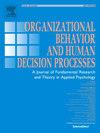“You knew what you were getting into”: Perspective differences in gauging informed consent
IF 3.8
2区 管理学
Q2 MANAGEMENT
Organizational Behavior and Human Decision Processes
Pub Date : 2025-01-01
DOI:10.1016/j.obhdp.2024.104386
引用次数: 0
Abstract
We examine differences between perceived and experienced consent in organizational contexts—specifically, the aspect of consent that reflects how informed consenters feel. We theorize that people tasked with soliciting consent overestimate the extent to which consenters feel fully informed of what they are agreeing to and thus feel they have truly consented. We provide support for these predictions across six pre-registered studies (N = 2,993) and eight supplemental pre-registered studies (N = 4,406) that establish causal and mediation evidence, downstream organizational consequences, and real-world relevance. This research reveals that even when an agreement meets the legal criteria for consent, there may be misaligned perceptions of employees’ feelings of consent, with consequences for employees’ relationship with their organization. The current studies offer a significant step forward in understanding the markedly understudied role of consent in organizations.
"你知道你在做什么":衡量知情同意的视角差异
我们研究了组织环境中感知到的同意和经验到的同意之间的差异——具体来说,是反映知情同意者感受的同意方面。我们的理论是,负责征求同意的人高估了同意者对他们所同意的内容的充分了解程度,从而认为他们已经真正同意了。我们通过6项预注册研究(N = 2993)和8项补充预注册研究(N = 4406)为这些预测提供了支持,这些研究建立了因果和中介证据、下游组织后果和现实世界相关性。这项研究表明,即使协议符合同意的法律标准,也可能会对员工的同意感受产生不一致的看法,从而影响员工与组织的关系。目前的研究提供了一个重要的一步,向前理解在组织中明显未被充分研究的同意的作用。
本文章由计算机程序翻译,如有差异,请以英文原文为准。
求助全文
约1分钟内获得全文
求助全文
来源期刊
CiteScore
8.90
自引率
4.30%
发文量
68
期刊介绍:
Organizational Behavior and Human Decision Processes publishes fundamental research in organizational behavior, organizational psychology, and human cognition, judgment, and decision-making. The journal features articles that present original empirical research, theory development, meta-analysis, and methodological advancements relevant to the substantive domains served by the journal. Topics covered by the journal include perception, cognition, judgment, attitudes, emotion, well-being, motivation, choice, and performance. We are interested in articles that investigate these topics as they pertain to individuals, dyads, groups, and other social collectives. For each topic, we place a premium on articles that make fundamental and substantial contributions to understanding psychological processes relevant to human attitudes, cognitions, and behavior in organizations. In order to be considered for publication in OBHDP a manuscript has to include the following: 1.Demonstrate an interesting behavioral/psychological phenomenon 2.Make a significant theoretical and empirical contribution to the existing literature 3.Identify and test the underlying psychological mechanism for the newly discovered behavioral/psychological phenomenon 4.Have practical implications in organizational context

 求助内容:
求助内容: 应助结果提醒方式:
应助结果提醒方式:


